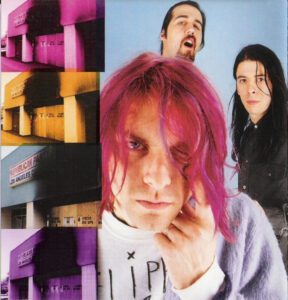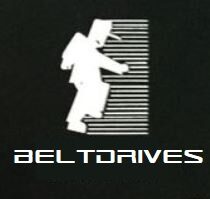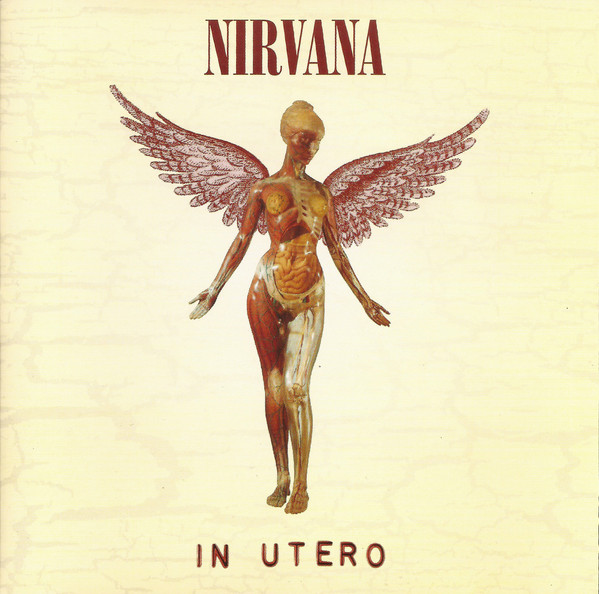In Utero – Nirvana – Released September 21, 1993
Today marks the 30th anniversary of the release of In Utero, Nirvana’s third studio album which, as it happened, also turned out to be their last one before the death of Kurt Cobain just seven months later.
Released two years after their breakout mainstream hit, Nevermind, In Utero saw the band returning to a more edgy, less radio-friendly sound because back in the 90s not being a sellout was important, especially to Kurt Cobain.
As a consequence much of this album is more abrasive and experimental than its predecessors while at the same time showcases some of Cobain’s best songwriting including Pennyroyal Tea, All Apologies and Dumb – all of which would later feature on the MTV Unplugged album a year later.
In Utero is hands down my personal favourite album by Nirvana, while its predecessor, iconic though it may be, is actually the Nirvana album I like the least.
And while we’re on the subject, time for a confession – I’ll freely admit to you all right here and now that, at the time this album came out, I loathed Nirvana and it would take a few more years for my love to be properly kindled.
Grunge and Begrudgery
There are a few reasons for this.
Firstly, as mentioned in last week’s Judgement Night Soundtrack review, we had stupid schoolyard politics to contend with. You simply weren’t allowed to like rock music if you also liked electronic music and hiphop. If you did, you got beat up – sad but true, as Metallica would say.
Second, though I’ve always loved rock music, 90s Nirvana fans tended to be a mopey bunch of muppets whereas at the time I was too busy enjoying the futuristic possibilities afforded by sampling technology, as exemplified by groups like The Prodigy and Altern 8.
This was further augmented by my almost visceral reaction to the video for Smells Like Teen Spirit.
It’s not a full-on disgust, more that low-level creepiness you might experience sitting on the toilet when a cockroach comes crawling under the bathroom door and you can hear his big hairy legs tacking along the tiles as he scuttles in the direction of your pulled-down trousers.
I’ve always had what you might call a high degree of aesthetic sensitivity and so the gloomy, sepia-toned claustrophobia of the Smells Like Teen Spirit video always made me feel uneasy.
In retrospect, that was probably the main contributing factor to me quickly dismissing the band as a bunch of miserable, moany bastards.
Which brings me to the fourth and perhaps most obvious reason I didn’t click with Nirvana at the time – I wasn’t old enough to understand them yet.
It took another couple of years, plus repeated plays of this album during extended Super Nintendo sessions at a friend from school’s house, before my defences were gradually worn down enough for me to stop and actually listen to the music and lyrics.
Slowly but surely, I finally began to appreciate and, eventually, love the band.
In Utero was the album that got me there, though advancing years turning me into a moody hate-the-world teenager invariably helped.
Teenage Angst Has Paid Off Well
It is with these immortal words that In Utero begins on the opening track, Serve The Servants. The song is easily one of Kurt’s most personal songs, as he comes to terms with his family trauma and his well-publicised struggles with fame.
Scentless Apprentice is a vicious chugging headbanger of a track where Kurt really lets rip on the “chorus”, for lack of a better word, howling, screaming and snarling over Dave Grohl’s thunderous drumming – definitely not one for the airwaves.
Heart Shaped Box, on the other hand, was specifically for the airwaves as it was the album’s first released single.
It’s easily one of my favourite tracks by the band though I’m at a loss to explain why. The riff and raspy chorus are as close to the Nirvana blueprint as it’s possible to get and yet there’s a certain magic to this one.
Heart Shaped Box – Nirvana
Then comes Rape Me. Once again this is a track about Kurt’s attempts to come to terms with the fame which came as a consequence of the success of Nevermind. As such, it’s essentially a musical parody of Smells Like Teen Spirit.
Kinda ballsy making a parody of your best-loved single but then that was Kurt Cobain in a nutshell. Sorry to say though, if we’re talking about parodies of Smells Like Teen Spirit, I still think Weird Al Yankovic done it better.
Track five, Frances Farmer Will Have Her Revenge On Seattle, is delightfully raw and unpolished, with delicious squeals of feedback and low-fi garage band vibes. During the chorus, Kurt sings, “I miss the comfort in being sad” though I always thought he said, “I miss the comfort of being sane”, but I guess either works.
Dumb is easily one of the best songs Kurt ever wrote. Let’s face it, none of us were expecting to hear a cello on a Nirvana album but its addition is part of what makes the song so special.
The lyrics, about the trade-off between intellect and happiness, provide another window into his soul and certainly resonated with all us oddball teens who felt far more comfortable listening to music at home than outside in a field chasing a ball.
Dumb – Nirvana
Very Ape was the song which prompted an argument between me and that aforementioned school friend as to whether or not the opening riff was sampled in The Prodigy’s Voodoo People (which was released the following year in 1994).
In those days there was no Who Sampled to look up and even if there was, the internet was just something in America you heard about on TV, so I had to wait a few years before I was proven right.
Not much else to say about Very Ape, it’s another straight-up rock track that comes in at just under two minutes, though you could easily double its runtime and it would still sound too short.
Very Ape – Nirvana
Milk It is one of the more savagely experimental tracks on the album both musically and lyrically. The chorus, or let’s call it a refrain since a chorus is usually sung rather than violently screeched into a microphone, is incomprehensible. Feel free to Google the lyrics, but they’ll only make even less sense if you do.
This is followed by Pennyroyal Tea, a song all about, well, Pennyroyal Tea, as well as other recuperative substances like warm milk, laxatives and cherry flavour antacids. I was always partial to the MTV Unplugged version of this song, ideal for those hungover Sundays when we all yearned for a nice, quiet Leonard Cohen afterworld.
Radio Friendly Unit Shifter has, once again, a live-sounding garage band feel full of loud squawls of feedback and Sonic Youth-style distortion effects. It’s certainly not radio-friendly though, ironically, it was used as the theme music to Irish telly’s top 40 hits show back in the 90s.
Tourette’s is aptly named as Kurt roars incomprehensibly for a minute and a half over a typically grungy riff and Dave Grohl gives the drumkit an almighty pummelling.
Listening back to it now I can vividly recall the giddy joy of a rowdy 90s moshpit, being smashed about on a pinball table made of thick skulls and elbows. If I close my eyes it’s just like I’m there.
All Apologies is yet another excellent example of Kurt’s expert songwriting; catchy, infectious and boasting idiosyncratic lyrics such as the immortal line, “I wish I was like you, easily amused.”
The song would later be covered by Sinead O’Connor (herself no stranger to the anxieties of uninvited 90s stardom, record company scumbags and relentless tabloid tossers), lending her own haunting sensibilities to the song.
The album apparently ends – well if you had it on tape or vinyl it did – but if you had one of those fancy, modern, new-fangled CD players and left the album playing something magical happened… the obligatory 90s album hidden song.
As they had done previously on Nevermind (and as featured on other albums also like Bjork’s Debut), Nirvana includes a hidden song on In Utero called Gallons of Rubbing Alcohol Flow Through the Strip, an extended jam session full of jangling detuned guitars and screeching amp feedback.
All the while Kurt rambles nonsensically like some Jim Morrison parody, chuckling occasionally at the silliness of it all with, we’re left to assume, lots of in-jokes we’re not party to dropped in amidst the noise and the chaos.
It’s just a bunch of guys in the studio, having fun, being loud and giving a final one-fingered fuck you salute to the record executives – and a well-deserved one at that.
The Last Rockstar
Nirvana had a profound effect on my generation for many reasons, including our subconscious tendency to write “never mind” as one word. But mainly it’s about the music.
The 90s was a pivotal decade; culturally, technologically, politically and, of course, musically.
On the one side of the Atlantic, the sweaty neon euphoria of the rave scene, on the other, the angsty nihilism of grunge and so-called “alternative”. We all felt like we were fighting the system in one way or another, but all the while something far more insidious was taking place.

Culture was being commoditised at an unprecedented rate, and the digital frontier, once the last refuge of the weird and interesting, was becoming commercialised with alarming speed and efficiency along with the privatisation of our natural resources, public services and community spaces.
When Kurt Cobain died, he took the best aspects of the 20th century with him. He was the last true rockstar – anti-fame, anti-establishment, anti-bullshit. A true artist but a tortured and ultimately self-destructive one.
The posthumous MTV Unplugged album was a huge success on release in 1994. Throughout the recording Kurt seems at ease, his humour sometimes self-deprecating, other times cracking wise, “What are they tuning a harp?”
Around this time Cobain had hinted that perhaps he was ready to unplug for good, ditch the cacophonous world of rock and roll fame and go fully acoustic. Who knows, in an alternative timeline he could have become Gen X’s own answer to Dylan. Except history had other plans.
And, unlike previous decades, nobody was waiting to fill the vacuum.
In the ensuing years, we watched as MTV turned their back on music, Metallica cut their hair and selling out to the music business was normalised.
By the end of the 90s rock and roll was well and truly dead, replaced by bullshit Britpop, manufactured boybands, Dolly girls, cloned sheep and reality TV as our ever-growing obsession with celebrity ushered in a new age that glorified sensationalism over talent and engagement over artistry.
In a great final twist of commercial irony, Nirvana now exists for many as last summer season’s Primark t-shirts as worn by kids on viral videos who don’t even know the band exists. Meanwhile, their dad flips out because #millennials – I’ve encountered at least 7 variations of this video, as I’m sure you have.
Doesn’t that make you angry? Great cuz we got another 7 lined up, plus a whole playlist of videos of kids ignorant of things that existed before they were born – they don’t know what a CD is, doesn’t that just make you furious? Damn millennials… and immigrants too, am I rite?
Because that’s what you’re supposed to be angry about.
Forget climate change, government incompetence, corporate malfeasance, job insecurity, rising inequality, soaring living costs… no no, watch this shit instead and get angrier with every click.
Or, alternatively, stop habitually clicking on rage bait, grow the fuck up and go listen to some fucking Nirvana.
There are better ways to connect with people than via social media. Even a stray elbow in the face can be a communal and deeply meaningful experience with the right people and the right music. You feel the blood rush, wonder if it’s going to bruise but you don’t care, this is too much fun. All that bottled up aggression released in a communal cathartic ruckus.
What the world needs right now is more mosh pits.

